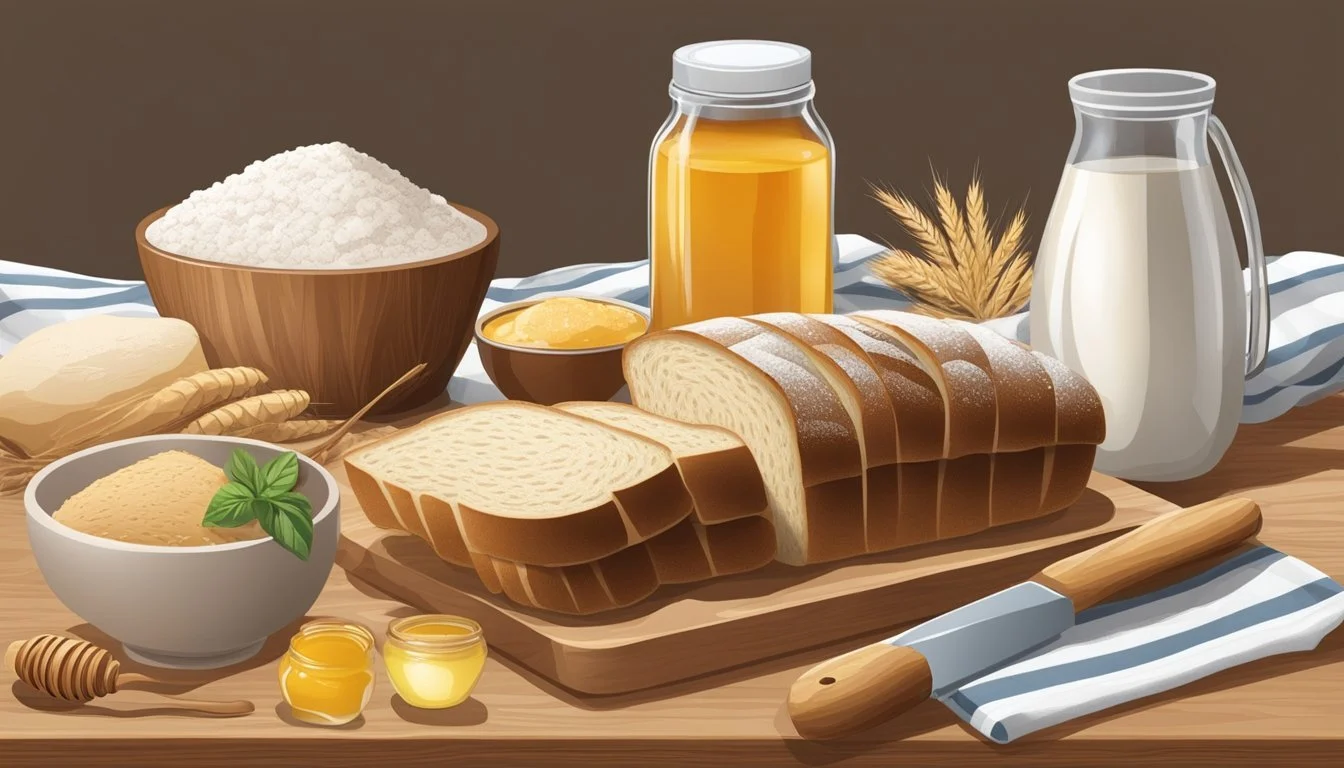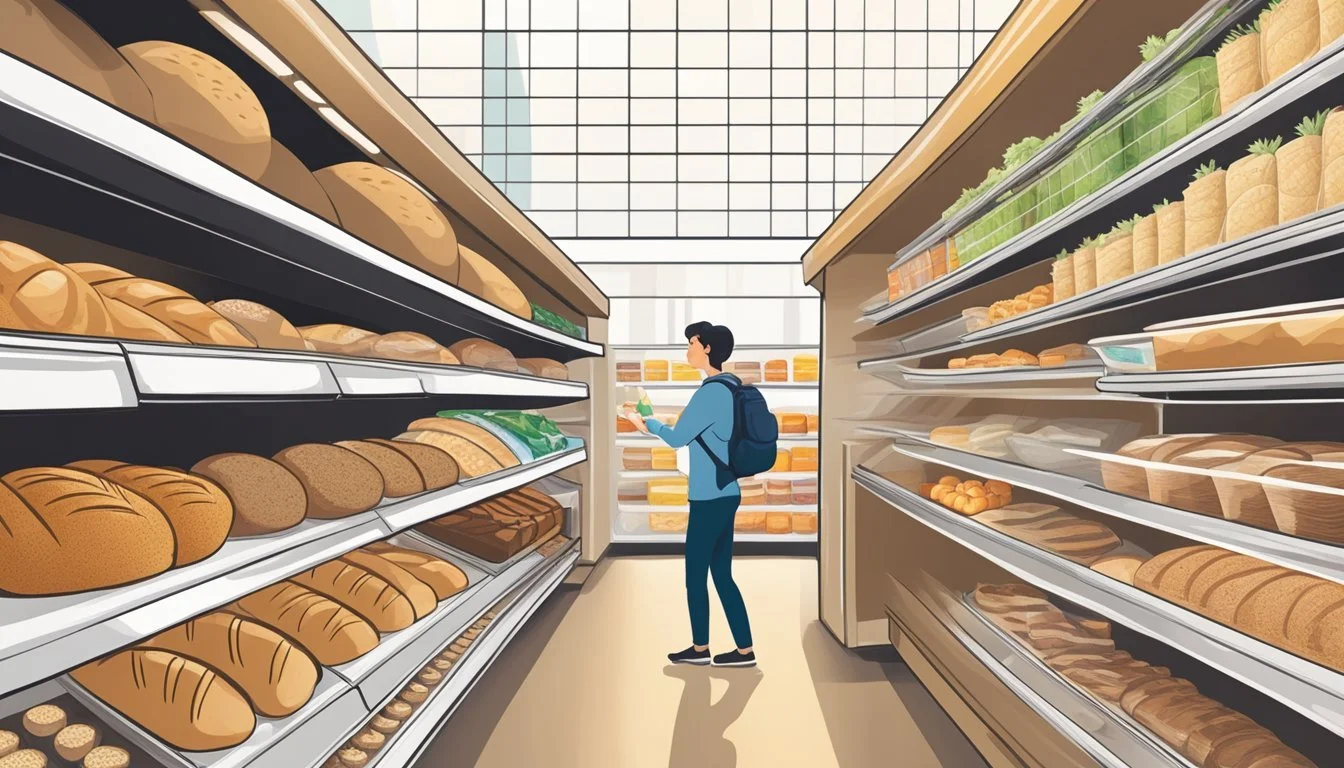Ezekiel Bread Substitutes
Top Alternatives for Healthy Baking
Ezekiel bread, often celebrated for its nutrient density and absence of artificial additives, is a popular choice among health-conscious consumers. It’s crafted from sprouted whole grains and legumes, which enhances the bioavailability of its nutrients, making it a more nourishing option than many traditional breads. Its unique combination of ingredients, such as wheat, barley, beans, lentils, millet, and spelt, not only contribute to its rich nutritional profile but also give it a distinctive taste and texture that can be difficult to replicate. Given its specific composition, individuals searching for substitutes for Ezekiel bread either due to dietary restrictions or personal taste preference may look for alternatives that align similarly with nutritious ingredients and health benefits.
Substitutes for Ezekiel bread can take various forms, from different types of whole grain bread, like 100% whole rye bread, to low-carb and keto diet-friendly options. Rye bread, for instance, stands out as a viable alternative thanks to its content of vitamins and minerals like vitamin B, folate, calcium, potassium, and magnesium, and the use of whole rye kernels ensures a comparable whole grain experience. It's crucial that the substitutes maintain the integral aspect of whole grains to approach the nutritional standard set by Ezekiel bread.
For those adhering to specific dietary regimes such as low-carb or keto diets, bread alternatives that can still satisfy sandwich cravings and maintain a semblance of traditional bread might include low-carb bread options with reduced carbohydrate content or bread-like alternatives. These can range from innovative creations like egg wraps, which provide a protein-rich and adaptable base for a variety of fillings, to flax-based bread options designed to offer fiber and essential nutrients while keeping carbohydrate counts in check. These alternatives provide both versatility and nutritional value for those looking to diversify their bread choices without straying from their health objectives.
Understanding Ezekiel Bread
Ezekiel Bread is a type of whole grain bread that is distinguished by its unique ingredients and potential health benefits. Unlike conventional bread options, Ezekiel Bread incorporates a blend of sprouted grains and legumes, delivering a rich nutrient profile.
Composition and Nutritional Profile
Ezekiel Bread is made from sprouted whole grains and legumes, including wheat, barley, beans, lentils, millet, and spelt. This sprouting process enhances the bread's nutrient availability. The bread is abundant in protein, providing essential amino acids that are often lacking in standard bread. In terms of carbohydrates, it supplies a complex form that, along with dietary fiber, can assist in maintaining stable blood sugar levels.
The typical nutritional profile of Ezekiel Bread is:
Protein: 4-5 grams per slice
Fiber: 3 grams per slice
Carbohydrates: 15 grams per slice
In terms of minerals, Ezekiel Bread is rich in magnesium and potassium, contributing to muscle and nerve function. It also contains folate and vitamin B, which play key roles in energy metabolism and red blood cell formation.
Health Benefits
Due to its nutritional composition, Ezekiel Bread may offer several health benefits. The high protein and fiber content increases satiety, which can aid in weight loss by curbing appetite. The presence of dietary fiber supports healthy digestion. Moreover, the sprouting process used to make Ezekiel Bread increases digestibility and nutrient absorption, which can enhance overall health.
Research indicates that the fiber in Ezekiel Bread may help in maintaining healthy blood sugar levels, beneficial for those monitoring their blood sugar.
Potential Allergens and Dietary Restrictions
It is important to note that Ezekiel Bread contains gluten, as it is made with wheat and barley, making it unsuitable for individuals with celiac disease or non-celiac gluten sensitivity. Additionally, it includes soybeans, which are a common allergen. Those with allergies to these ingredients should avoid Ezekiel Bread or seek gluten-free alternatives if gluten is the concern.
Ezekiel Bread Alternatives
When seeking substitutes for Ezekiel bread, individuals often look for alternatives that align with specific dietary needs such as gluten-free or low-carb preferences. The following sub-sections outline bread options tailored to these particular requirements.
Gluten-Free Bread Options
For those requiring a gluten-free diet, alternatives to Ezekiel bread must avoid ingredients like wheat, barley, and rye. Oats are a naturally gluten-free grain, used in making oat bread, which can serve as a nutritious substitute. However, it is critical to ensure that the oats are certified gluten-free to avoid cross-contamination. Breads made from almond flour or chickpea flour also provide viable gluten-free choices that offer additional nutrients and are generally lower in carbohydrates compared to traditional bread.
Low-Carb and Keto-Friendly Bread
Individuals on a low-carb or ketogenic diet often search for alternatives that help maintain ketosis. Oopsie bread or cloud bread are prominent low-carb substitutes; these are typically made from eggs and cream cheese, resulting in a high-protein option with minimal carbs. Another keto-friendly bread is made with almond flour, which is high in healthy fats and fiber while being low in carbs. These selections cater to the dietary constraints of the ketogenic lifestyle, offering a way to enjoy bread-like products without the typical carbohydrate content.
Considering Taste and Texture
When searching for alternatives to Ezekiel bread, it's essential to consider the taste and texture that appeal to you. Ezekiel bread is known for its distinctly nutty flavor and firm texture, due to the combination of sprouted grains and legumes it contains.
Substitutes like whole grain bread reflect a similarity in taste and texture, providing a dense, chewy experience alongside a complex, wholesome flavor. Whole grain options are also rich in fiber and lower on the glycemic index, which may contribute to better blood sugar control.
Rye bread comes with its own unique taste profile and can vary in texture. For a closer match to Ezekiel bread, select 100% whole rye bread, which maintains a dense and hearty texture with a slightly sour touch. It offers a range of vitamins such as B, folate, as well as minerals like calcium, potassium, and magnesium.
For those seeking a lower-carb option, cauliflower bread offers an alternative texture that's surprisingly bread-like. While it doesn't replicate the nutty flavor of Ezekiel bread, it serves as a savory choice that adheres to gluten-free dietary needs.
Bread Type Texture Flavor Nutty Flavor Presence Whole Grain Bread Dense, Chewy Wholesome Yes Rye Bread Dense, Variable Slightly Sour Mild Cauliflower Bread Bread-like Savory No
One should be mindful that while substitutes can mimic aspects of Ezekiel bread's taste and texture, each variety has distinct flavors and textural nuances that may suit different preferences.
Home-Made Substitutes
Creating home-made substitutes for Ezekiel bread allows individuals to tailor ingredients to their preferences and dietary needs, especially for those looking to avoid preservatives and added sugars found in some store-bought bread.
Recipes for Ezekiel Bread Substitutes
Home bakers can make Ezekiel bread substitutes using a combination of whole grains and legumes. A fundamental recipe would include sprouted grains such as wheat, millet, and barley. Sprouting enhances the nutrient availability in grains. Users can start by sprouting these grains at home, which involves soaking them in water and allowing them to germinate.
Ingredients for a basic Ezekiel-style bread:
1 cup sprouted wheat berries
1/2 cup sprouted barley
1/2 cup sprouted millet
1/4 cup sprouted lentils
2 tablespoons sprouted soybeans
1 tablespoon sprouted spelt
1 1/4 cup warm water
1 tablespoon active dry yeast
1 teaspoon salt
Mix the sprouted grains and legumes until a fine texture is achieved. Combine warm water, yeast, and salt, and then integrate with the grain mixture. Allow the dough to rise before baking.
Sprouted Grain Alternatives
Individuals can opt for other sprouted grain alternatives utilizing ingredients like flaxseeds or almond flour for a gluten-free option. The addition of flaxseeds not only offers a rich source of Omega-3 fatty acids but also provides an earthy, nutty flavor similar to Ezekiel bread.
Sprouted Grain Bread with Flaxseeds:
2 cups almond flour
1/2 cup ground flaxseeds
3 eggs
1 teaspoon baking soda
1/4 teaspoon salt
1/2 cup water or dairy-free milk alternative
Combine the dry ingredients, then add in the eggs and liquid of choice. After mixing well, pour the batter into a loaf pan and bake until it’s cooked through. This variety of bread substitutes not only replicates the dense texture but also aligns with dietary preferences that exclude conventional flour.
Specialty Bakery and Store-Bought Alternatives
When looking for substitutes for Ezekiel bread, consumers have a range of pre-packaged and frozen options that offer similar nutritional benefits. Specialty bakeries and grocery stores provide a variety of breads made from organic grains and whole wheat that can serve as excellent substitutes.
Pre-Packaged Ezekiel Bread Substitutes
Whole Wheat Bread: Whole wheat bread is a readily available alternative, often enriched with vitamins and minerals. One should look for 100% whole wheat options to maximize nutritional content.
Multigrain Bread: Multigrain breads containing a blend of grains can provide a diverse nutrient profile, offering a rich source of fiber and other nutrients.
Sourdough Bread: For those who prefer a tangy flavor and a different texture, sourdough bread is a great option. Its fermentation process may also make it easier to digest for some people.
Gluten-Free Alternatives: Individuals with gluten sensitivities can opt for gluten-free bread varieties often made from rice or almond flour, which are becoming more common in stores.
Note: Always check the ingredient list for the presence of organic grains to ensure the closest match to Ezekiel bread's nutritional advantages.
Frozen Bread Options
Food for Life Frozen Breads: Food for Life offers a selection of frozen breads, including low-carb versions of Ezekiel bread. These are particularly useful for individuals monitoring their carbohydrate intake.
Sprouted Grain Breads: Sprouted grain bread in the frozen section often retains more natural nutrients and can be a great alternative to Ezekiel bread. Look for breads with a blend of sprouted grains for the fullest nutritional benefit.
Important: When selecting frozen breads, consumers should consider breads that are free from preservatives and artificial additives to stay as close as possible to the natural composition of Ezekiel bread.
Unique Substitute Ideas Beyond Bread
Exploring alternatives to traditional bread can open up a world of flavors and nutritional benefits. This section introduces unique substitutes that go beyond standard bread options.
Vegetable-Based Alternatives
Vegetable-based alternatives provide a fresh and nutritious way to replace traditional bread. Sweet potato toast stands out as a popular choice, not only for its rich flavor but also for its high content of fiber and vitamins. Simply slice and toast to enjoy a bread-like experience. Lettuce wraps offer a crunchy, hydrating alternative, ideal for those looking to reduce calorie intake while still enjoying the wrap experience. Other vegetables like collard greens can also be used as sturdy wrappers for various fillings.
Grain-Free and Seed Breads
For those avoiding grains, bread made from a mixture of seeds and nuts offers a dense, protein-rich alternative. These breads often incorporate pumpkin seeds, sunflower seeds, and various nuts, which contribute to a high fiber content and a satisfying texture. They are suitable for toasting and can be used as a drop-in replacement for traditional bread slices.
Unconventional Wraps and Buns
Adventurous eaters might consider using cheese as an innovative substitute for wraps or buns, particularly in the form of baked cheese crisps which can hold fillings like a regular taco shell. Nori sheets, typically used for sushi rolls, are also an excellent, low-carb wrap alternative, adding a unique flavor profile. For burger enthusiasts, lentil-based buns can serve as a nutritious and savory option that enriches the meal with additional protein and fiber.
Nutritional Considerations for Substitutes
When exploring alternatives for Ezekiel bread, it's important to assess their nutritional profiles, specifically regarding calorie content, macronutrient balance, glycaemic index, and their potential impact on blood sugar levels.
Caloric and Macronutrient Comparisons
Calories: Substitutes can vary in caloric content. For instance, rye bread typically contains similar or slightly higher calories compared to Ezekiel bread.
Macronutrients: Ezekiel bread is known for its balanced macronutrient profile. Alternatives, such as 100% whole rye bread, closely match this with their content of carbohydrates, protein, and fat:
Carbohydrates: Whole rye bread contains complex carbohydrates, while maintaining a low sugar content.
Protein: Often comparable to Ezekiel bread, providing necessary amino acids.
Fat: Generally low in fat, with some containing beneficial monounsaturated and polyunsaturated fats.
Glycemic Index and Blood Sugar Impact
Glycemic Index (GI): To manage blood sugar levels, the GI of bread substitutes is crucial. Ezekiel bread tends to have a lower GI, beneficial for blood sugar control.
Blood Sugar Levels: Substitutes like whole grain bread usually have a lower glycemic index compared to white bread alternatives, which helps in maintaining steadier blood sugar levels.
Impact on Health: The glycemic index of bread affects how quickly glucose is absorbed, influencing energy levels and the risk for developing insulin resistance. High-fiber, low-GI options are preferred for overall health.
Shopping Tips
When seeking substitutes for Ezekiel bread, shoppers should consider the preservatives used in potential alternatives. Preservative-free loaves often have a shorter shelf life but offer a fresher taste and fewer health concerns related to artificial additives.
It's essential to scan labels for nutritional value. Whole grain options such as 100% whole rye bread boast a similar fiber count and rich nutrient profiles, including vitamins and minerals like B, folate, calcium, and magnesium. Consumers should be wary of options with added sugars—many breads disguise sugars under different names, such as dextrose, fructose, or high fructose corn syrup.
Flavor profiles matter too. Those accustomed to the distinctive taste of Ezekiel bread might prefer pumpernickel or sourdough for their complex flavors compared to plain wheat breads. Always remember, the fewer the ingredients, typically the closer it is to natural Ezekiel bread.
When it comes to longevity, sourdough has a longer shelf life due to its natural fermentation process, which also helps to reduce phytates that can limit nutrient absorption.
For a quick reference:
Bread Type Preservatives Nutritional Value Added Sugars Flavors Shelf Life 100% Whole Rye None High None Mild Moderate Pumpernickel Varies Moderate Low/None Strong Moderate Sourdough None High None Tangy Longer Whole Wheat Varies High Varies Mild Moderate
In conclusion, favor breads with clear ingredient lists, low in sugars, without unnecessary additives. This ensures a healthier choice that aligns closely with the benefits of Ezekiel bread.







